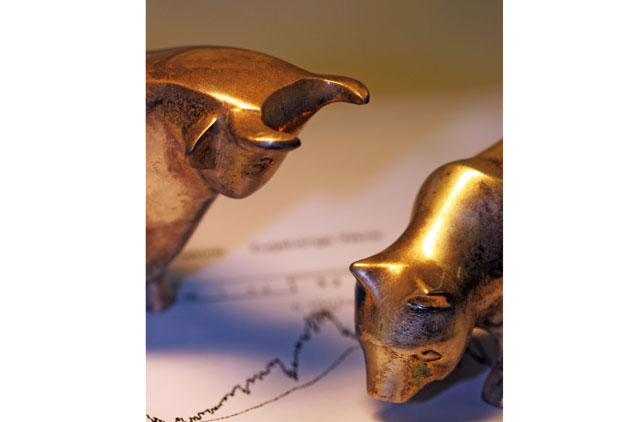
Whether it is real estate, gold or deposits, investment options for NRIs (Non-resident Indians) seem to be stabilising after much volatility in recent times. While markets continue to be unpredictable, the situation can easily be turned to your advantage. "NRIs typically remit money for their local needs, to buy real estate and, convinced of the long term growth story of India, to invest in equities and debt. According to a World Bank report, in 2011 India received the highest remittances in the world — close to $58 billion (Dh213 billion) and all from NRIs," Sumeet Bhambri, General Manager, Wealth Management, Middle East, Standard Chartered Bank (SCB), tells GN Focus.
We take a look at some ways those remittances can be used to maximum effect.
REAL ESTATE
Analysts say it is rare to come across an NRI who does not want to invest in real estate. While it remains ideal as an investment, in this increasingly transient employment scenario, it is not unlikely that a shrewd property investment may become a home on relocation. Pegged to economic growth, real estate in India is seeing exciting times. While metros are always the safest investment options, when it comes to resale value, tertiary cities are fast becoming attractive. Experts say that real estate as an asset requires an investor to have a long-term investment horizon, with three to five years being a reasonable time frame.
"Tier I cities such as Delhi and Mumbai may be a bit out of reach now for the average investors. Tier II cities such as Noida, Gurgaon and Faridabad are a great option for mid- to long-term investments," says Ishaan Bhardwaj, Research Analyst, Gerson Lehrman Group.
Builders and buyers are now serious about these emerging urban areas, largely because of the growth of business activities in these cities. Plus, many banks are bullish on Indian real estate and often present NRI mortgage seekers with a list of pre-approved projects to choose from within the country.
Khalid Shamim is a financial consultant at wealth management firm Mondial Dubai. He says the current stagnant state of residential real estate in Tier I cities such as Mumbai and the National Capital Region (NCR) has prompted investors to look towards Tier II cities as investment options due to the benefits that newly developing cities present. He advises investors not to limit themselves to one category but also consider commercial as well as residential properties in small cities.
But sales volumes are rising. In the fourth quarter of last year, total sales volume for the top six cities improved 26 per cent year-on-year and sales values rose 19 per cent. While prices in Mumbai and Delhi appreciated between 5 and 25 per cent year-on-year, prices in Tier-II cities climbed nearly 10 per cent.
Tuesday's 50 basis points (bps) interest rate cut by the Reserve Bank of India (RBI) coupled with earlier cut in the Cash Reserve Ratio has raised hopes for cheaper loans in India. Homes are now expected to become more affordable, since a 1 per cent cut in home loan rates can increase affordability 7 to 9 per cent.
On the other hand are those who expect prices to stay unchanged — or go up. One of these is Om Ahuja, CEO - Residential Services at Jones Lang LaSalle India. "We do expect that there will be a marginal increase in home loan borrowings because of this positive move," he says. "The series of hikes in the past have also affected the price that builders put on their properties, since their own cost of borrowing has increased. It is unlikely that property prices will come down because of this rate cut, and it is the price of properties that is the decisive factor in residential real estate sales. In fact, it is very likely that there will be an upward bias on property rates because of the anticipated improvement of sentiments with buyers who have so far been sitting on the fence, waiting for some signals of relief," he adds. Regardless of price movement, fence sitters should keep in mind that property is widely seen as a stable investment.
GOLD
Gold has always been an attractive investment for Indians, who account for 25 per cent of total global demand. It is the largest market for gold in the world with an annual consumption of close to 800 tonnes. "Despite a pullback from its all-time high of $1,923 an ounce a few months ago, gold is still trading in the $1,630 range," says Shamim.
The confidence is not misplaced since gold has enjoyed an 18.5 per cent Compound Annual Growth Rate (CAGR) over the last decade. Bhambri says: "Developed markets' incentive to inflate, negative real interest rates, central bank buying, China/India demand and weak supply growth supports the long term fundamentals for gold. Should growth falter, we believe central banks will once again turn towards gold to avoid any whiff of deflation. Gold continues to have portfolio diversification benefits in this environment and remains a preferred investment option for NRIs as well."
Shamim expects gold prices to cross $2,200 an ounce in the next year. He says: "Considering the liquidity created by global central banks in the last four years, high inflation is only the obvious consequence. Empirically it has been proved that gold is a good hedge against inflation. Also in view of our technical chartists the uptrend in gold prices is still intact in spite of the recent correction that we have witnessed."
FUNDS
Bhardwaj advises NRIS to trade in gold via Exchange-traded funds (ETFs), by using their NRE (Non-Resident External) and NRO (Non-Resident Ordinary Rupee) accounts. A call to your relationship manager should help you set up an account to trade in ETFs.
Overall, ETFs are seeing serious interest from NRIs. Along with mutual funds they are good for portfolio diversification. ETFs offer an attractive way of investing in equities. The National Stock Exchange of India offers a whole range of ETFs from Indian equity indices to gold and even foreign equity indices such as the Hang Seng index. "The basic advantage in investing in ETFs is to have a more passive approach to equity investing and to be able to diversify the portfolio risk in various asset classes," says Bhambri.
As investors get savvier, banks are creating products to match their appetite. Standard Chartered, for instance, offers its clients ETFs through its newly launched NRI three-in-one account, an online trading platform that allows access to trading, demat and the bank account with just one click. Be warned though that the rate of taxation is high — 30 per cent on short-term capital gains and 20 per cent on long term, apart from brokerage for buying and selling ETFs.
"NRIs can enjoy more benefits only if they have the appetite for large investments whose returns can cushion the impact of tax deductions and brokerage charges," says Bhardwaj.
When it comes to mutual funds, most experts have advised staying away in the last couple of years. According to reports by the Overseas Indian Facilitation, NRIs hold close to 2 per cent of all mutual fund accounts in India and share about 4.45 per cent of the total assets under management with the mutual funds industry. "Most equity funds have been underperforming other asset classes in the recent past, this has been a period of consolidation for global equity markets," says Bhambri.
But for those who know what they are doing and are blessed with good advisors, this is a good bet. "Equities have empirically proven to be by far the best performing asset class and the best hedge for inflation. We believe in our target markets of Asia, Africa and the Middle East and believe that the emerging markets including India and the UAE would significantly contribute to the global growth in the next decade or so. However, our suggested allocation to these markets would vary with the risk profile and the investment objective of each of our clients," says Bhambri.
DEPOSITS
Bank deposit rates have shot up in recent times and analysts now advise locking up money for as long as possible, since the current rates of between 8 and 10 per cent for NRE and NRO deposits are not sustainable in the long term. "Fixed deposits are a really good option for secure mid-to-long-term gains," says Bhardwaj. "The interest from such a deposit is added to your income and taxed accordingly so it is best to choose two-to-five-year terms. Such periods also offer higher interest rates."
Yet, not all advisors are in favour of deposits. "The issue with such a vehicle is currency risk. An investor choosing these vehicles would prefer bringing the funds back to their country of present residence. However, as the NRE deposits are local currency deposits, the rate at which it gets converted to dollars is unpredictable," says Bhambri. "Say a client today invests $100,000 in an NRE deposit giving him returns of 9.5 per cent per annum for one year. Now to hedge his currency risk (which has its own costs attached) the investor could book a forward cover. However one-year forwards are fixed at a premium of between 4 per cent to 5 per cent, thus in dollar terms returns are only 4.5 per cent to 5.5 per cent."
INSURANCE
Even though insurance is no longer a simple product, experts say that it is best to stick to its cheapest form — term insurance. Shamim says, "Putting money in insurance should never be regarded as investment but as an expense. Unfortunately a lot of people regard this as an investment."
Insurance in India is an expensive product and subject to much aggressive selling, our experts say. Bhardwaj says: "You will have to consider whether you need insurance or not and if you do, consider buying the cheapest form of insurance, which is term insurance. The only advantage of buying an insurance policy in India, apart from the insurance that it offers, is that there is a tax deduction up to Rs100,000 (about Dh7,159) available on such an investment, which helps if you have taxable Indian income."
Pension funds, often sold by insurance companies, are more of an investment, even if there is an insurance component woven into them. Experts advocate getting started on a pension fund as early as possible. Shamim says, "At a young age, you can save more, take a relatively higher risk and get higher returns. The closer one gets to retirement, the more conservative the outlook."
Since pension funds are long term, there is an additional word of advice. "Check carefully where the money is being invested," Shamim says. "The performance of those underlying funds, that is what will determine the risk. Ideally, the fund should be diversified."
That's good advice for your portfolio in general.














